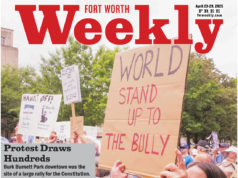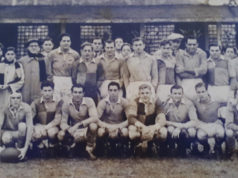Official e-mails are public records – even at TCC.
By BETTY BRINK
Leonardo de la Garza has spent decades helping lead public colleges. Since 1997 he’s been chancellor of the Tarrant County College District. Prior to that, he was president of two colleges and vice-president at two more.
“You would think that he would know the law by now” regarding preservation of public documents, Bob Mhoon said. Mhoon is one of the harshest critics of de la Garza’s stewardship of TCC, based partly on what he’s learned in battles to force the college to reveal various public records.
But in an e-mail sent to several TCC board members and his second-in-command in May, de la Garza proposed the destruction of public documents related to the $238 million purchase – in cash – of the 35-acre RadioShack complex for the district’s downtown campus, one of the more controversial land deals ever made by the college. Deleting the e-mails would be illegal, according to a state official charged with oversight of the open records act.
“Now that this and the accompanying e-mails have served their purpose and are no longer needed, I suggest we all go ahead and delete them,” de la Garza wrote on May 12 to Vice Chancellor David Wells and board members Bobby McGee, Louise Appleman, Randall Canedy, and Kristin Vandergriff.
The e-mail was one of hundreds exchanged in the previous six months among the few key people involved in the secret negotiations to buy the RadioShack property. Mhoon obtained the e-mails in response to an open-records request. The version of the message eventually released – after a several-months-long fight with the college – was from the personal computer of McGee, the TCC board vice president. He verified its accuracy to Fort Worth Weekly.
Interestingly enough, though Mhoon had requested copies of e-mail correspondence from de la Garza, Wells, and all seven TCC board members, the McGee version was the only one he received, suggesting that perhaps the copies that went to board members and Wells were indeed deleted. Neither de la Garza nor any of the other board members copied on the original e-mail have responded to the Weekly’s calls seeking to find out whether they erased the messages.
“Intentionally destroying public documents [before they have reached the end of their required retention time] is clearly illegal and punishable under the Texas Penal Code,” said Tim Nolan, spokesman for the Texas Library and Archives Commission. That agency has the authority under the Texas Government Code to mandate what types of public materials must be kept and for how long.
“There is no gray area of the law on this one,” Nolan said. The code makes it a Class A misdemeanor if a person “intentionally destroys, conceals, removes, or otherwise impairs the … availability of a governmental record.” The offense becomes a felony if the intent is to defraud or harm someone. Penalties, on conviction, range from fines to felony jail time.
Because the e-mails that de la Garza wanted destroyed dealt with contract negotiations for the purchase of property by a public college using public funds, as well as a change in the stated plans of the college for its downtown campus, Nolan said the e-mails would fall under a couple of the commission’s categories of materials that must be preserved by local governments. One mandates that “contracts, leases and agreements, including reports, correspondence … and similar records relating to their negotiation” be kept for four years. Another calls for a five-year retention of all “correspondence and internal memoranda pertaining to the formulation, planning, implementation, or redefinition of the policies, programs, services or projects of a local government.”
Any prosecution of individuals for destroying such records would be initiated by the local district attorney, Nolan said. Ann Diamond, deputy chief of the Tarrant County District Attorney’s civil division, said a citizen would first need to file a complaint with local police, who would send it to the D.A. for investigation. “Interestingly, if one person kept the e-mails or documents, they may have saved those who deleted them [from prosecution] because the record would have been preserved,” she said.
McGee refused the chancellor’s suggestion to delete his e-mails, and his copies therefore eventually made their way to Mhoon. “I believe completely in the people’s right to know what’s being done in their name and with their tax dollars,” the two-term trustee said. “All of us who are in public life work for the people, including the chancellor, and we mustn’t forget that.” By destroying the e-mails, “it would seem we had something to hide,” he said, “and that is the farthest from the truth.”
Mhoon’s request for records, filed on June 3, must have made some people at TCC uncomfortable, because at that point the deal to buy the RadioShack campus from its owner, the German-based hedge fund Kan-Am Grund, hadn’t even been hinted at publicly. The deal wouldn’t be revealed until the full board approved it on June 25, with little warning or opportunity provided for public discussion.
The May 12 e-mail from de la Garza was in response to one sent from McGee, a member of the board’s land committee, referring to a meeting to be held the next day in which McGee, the chancellor, and Wells were to apprise the other land committee members of the prospective purchase. Until that time, the deal was known only to McGee, de la Garza, Wells, and the brokers and lawyers for the three parties. It had been brewing since January, making it one of the better-kept secrets in Cowtown history.
With the RadioShack purchase, the district abruptly scrapped its grandiose plans, in place since 2004, for a new campus that would have been built on both sides of the Trinity River, northeast of the county courthouse. By the time the board switched gears, millions of taxpayer dollars had been poured into that project, several culturally sensitive sites had been bulldozed (including a chunk of the historic river bluff), and at least two major buildings were partially complete.
Mhoon has been filing records requests with TCC for more than a year. He’s incensed that the district continued to spend money on the doomed site while negotiating to buy the RadioShack property. “If there was ever a ‘public right to know’ issue on how something this stupid happened, with taxpayer dollars being thrown to the four winds, this is the one,” said the retired naval officer, who formerly taught computer hardware and software classes for TCC’s continuing education program and at other local colleges.
McGee said he knew it would have been wrong to destroy the e-mails, but he also had another motive for preserving them. “We did absolutely the right thing for the taxpayers and for the students when we decided to pursue the purchase of RadioShack,” he said. “There is nothing in that deal for us to hide.”
It was McGee, as a member of the board’s land committee, who first floated the idea with a RadioShack executive. “I was rebuffed initially,” he said, but later the corporation began serious negotiations, with McGee as the lead man behind the scenes. He contacted a Dallas broker to represent TCC – initially, McGee didn’t want the Germans to know the purchaser was a public college with a lot of cash on hand. “I thought they would hold out for lots more money if they knew that,” he said. Even RadioShack kept silent, as the company didn’t want anyone outside the corporate hierarchy to know the property was being sold. But McGee is quick to point out that he made no deals on his own. “I recommended only. All contracts and agreements were signed by the chancellor.”
McGee’s decision to seek an alternative to the original downtown campus site came when he learned in late 2007 that after three years of work on the project, the district had failed to apply for a crucial permit from the U.S. Army Corps of Engineers. The permit was needed to allow the college to build a large portion of the campus on the levee and in the flood plain on the north side of the river in historically and environmentally sensitive areas under Corps jurisdiction.
McGee was stunned. “That should have been the first thing done, certainly not the last,” McGee said. “I lost faith in the chancellor at that point,” he said. The costs had already escalated far beyond the original estimates, and with this new glitch, McGee saw nothing but a flood of red ink ahead. He called on the chancellor to fire the project manager and asked the board to halt construction, neither of which happened. McGee said he felt compelled to “stop the bleeding” and that RadioShack was the answer. “The e-mails tell the story,” he said, “and it is a story worth telling.”
Even though McGee approved the release of his e-mails, Bill Lace, the college administrator in charge of open records requests, tried mightily to deny access. Mhoon’s June 3 request was for the “past 90 days” worth of documents relating to the downtown campus, generated by the chancellor, Wells, or the board.
Mhoon, like the rest of the public, knew nothing about the pending RadioShack purchase. He made the request, he said, because of the downtown project’s escalating costs, slow progress, and potential effect on de la Garza’s job evaluation. Lace sent him a cost estimate of more than $900 for copying and mailing the records and for recovery of the e-mails he had requested. Mhoon appealed to the Texas Attorney General’s office, but it wasn’t until November that his appeal was upheld by the AG. In the end, he got the e-mails at no cost.
Two of the released e-mails, written before Mhoon’s June 3 request, refer to earlier conflicts between McGee and the chancellor over de la Garza’s policy of appealing each of Mhoon’s document requests to the attorney general’s office. The chancellor has lost on every round, but he was able to delay Mhoon’s access for months. McGee vigorously objected to the ploy.
On May 16, McGee wrote to de la Garza: “I’m not sure why we don’t just give this guy what he is asking for. Every time we rely on AG protection, or hide behind our attorneys, it gives credence to the impression that we are hiding something. As far as I know, we don’t have anything to hide, so what is it that we gain or protect by not opening up? … If I were on his side, this would begin to make me very suspicious … maybe border on paranoid. Do we really have a legitimate ‘confidentiality matter’ that justifies the cost of our resistance efforts? If so, it’s not clear to me.”
Three days later, the chancellor replied. “I hear you,” he wrote in part, “but it’s not that simple – not if I’m to do my job of protecting the College and the Board. In a perfect wor1d, where we wouldn’t have reason to be concerned that such a person would use certain information to try to cause harm to the College or its officers/trustees, I would be the first to let him have anything and everything he requested. … But that clearly is not the case with this individual.”
De la Garza acknowledged that his explanation “doesn’t get to the core of your question,” and referred to an earlier “information session” in which he had tried to respond to similar questions raised by McGee. “If we could come up with an acceptable strategy that would give us relief from having to continue dealing with this individual in the current fashion … I’d probably want to patent it!” the chancellor wrote.
State open-records law does not allow the motives of a records requester – or anything else having to do with the requester – to be taken into account when determining whether documents must be released. However, TCC has tried that tack before: In a letter to the attorney general protesting the release to the Weekly of other documents, TCC attorney Angela Robinson wrote that the newspaper’s request should be denied because it was made by a reporter with the intent of making the public information known to the public. The district lost that one too.
De la Garza’s claim that “his job is to protect TCC and its board from public embarrassment by filtering information is bizarre,” Mhoon said. “Basic civics says government is the servant and not the master of the people.”











